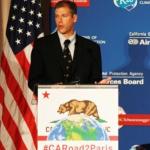State Department Science Envoy Explains Why Trump Drove Him to Resign

Energy researcher Daniel Kammen stepped down this week as a science envoy for the U.S. State Department. In a public resignation letter addressed to President Donald Trump, Kammen lambasted the president’s response to the recent violence in Charlottesville, Virginia. He also lamented what he called Trump’s overall “attacks on core values of the United States.” The first letters taken from each paragraph of Kammen’s letter spell the word “IMPEACH.”
Kammen is a professor of energy and director of the Renewable and Appropriate Energy Laboratory at the University of California, Berkeley, as well as a member of Scientific American’s board of advisors. He was one of eighteen scientists and engineers who have participated in the envoy program since the Obama administration established it, as part of an effort to develop scientific and technological partnerships with other nations in regions including the Middle East and Southeast Asia. In this position Kammen worked on energy and climate issues in Africa and the Mid-East.
In addition to citing Trump’s failure to denounce white supremacists in Charlottesville, Kammen said he felt the president’s actions and words had damaging consequences for his work as science envoy. “Your decision to abdicate the leadership opportunities and the job creation benefits of the Paris Climate Accord, and to undermine energy and environmental research are not acceptable to me,” Kammen wrote in his resignation letter. “Your actions to date have, sadly, harmed the quality of life in the United States, our standing abroad, and the sustainability of the planet.”
The White House did not respond to a request for comment. A State Department spokesperson said,in a statement emailed Wednesday, “Today, Dr. Daniel Kammen made a personal decision to resign. We appreciate his dedicated service to U.S. scientific diplomacy during his appointment.”
Scientific American spoke with Kammen about why he stepped down as science envoy, and what he hopes his resignation will accomplish.
[An edited transcript of the interview follows.]
What made you feel like you had to leave your role as science envoy?
From [Trump’s decision to withdraw] from the Paris climate accord, to not coming out clearly and forcefully against the neo-Nazis in Charlottesville, to the ban on travel and immigration, I feel the direction the administration is going is not consistent with the terms under which I was appointed science envoy. So it was a parting of ways, in terms of what I believe we should be doing and what the president seems to be doing. I was brought on as an envoy to promote international cooperation, energy and climate security, and sustainability. This administration doesn’t seem to value those things.
What effect do you believe your resignation will have? Did you step down more for your own peace of mind, or do you think your actions could affect Trump policy or attitudes?
I hope it brings further attention to the need for our president to act in ways that I believe are in the best interest of the country. I believe leaving the Paris climate accord was not in the best interest of the country. It certainly wasn’t good for job creation, international partnerships, or for sustainability of the planet.
But did you step down to bring the public’s attention to what is happening, or do you believe your resignation could actually change anything?
I think it could change things. Standing up and just shouting is not as useful as giving clear reasons. In the letter, I really tried to specify what of my decision. My letter was designed to pay homage to the very eloquent letter that was turned in last Friday when the president’s Committee on the Arts and the Humanities resigned. My letter was inspired in part by theirs, by the comments that both former Presidents Bush made condemning the president’s behavior—it’s really designed to add my voice to the dissatisfaction with the direction that Mr. Trump is trying to take the country.
Do you feel that others should follow your lead?
I believe that I for the right reasons. Whether other’s follow my lead is their own decision.
You worked as a science envoy in Africa and the Middle East. How have people in those parts of the world reacted to President Trump?
My focus is specifically on energy and climate, so people I’ve worked with in the ministries of energy are a bit dismayed because the U.S. and China played such a critical lead role in the Paris Climate Accord, and in making the conversation about sustainability broadly popular and understandable. [Other nations] are dismayed that the U.S. would step back from all that.
How has your work in those regions been affected by the president's words and actions?
Except for the White House, we’re seeing positive progress on sustainability. I think that one of the clear outcomes of President Trump stepping away from the Paris accord was that other countries stepped up their resolve and are pushing forward.
We are seeing now the very clear connection between climate protection and human rights, energy access, basic services for women and minorities—those are all important not just for economic development, but also for quality of life for people rich and poor around the planet. The Paris accord, what the pope wrote in [Laudato Si’,] his encyclical [on climate change]—these are all efforts to link sustainability and human rights. The reason why my letter cites Charlottesville, and the president’s speech last night [at a rally in Phoenix, Arizona], is that he seems to be stepping away from sustainable development. The president’s response—by not condemning in an unequivocal way the efforts of neo-Nazis—was a nod to divisive, non-progressive politics. The U.S. benefits by being open and inclusive, and he’s doing the opposite.
Recent Articles by Annie Sneed include Trump's EPA May Be Weakening Chemical Safety Law, Exploring the Mysterious Life of One of Earth's First Giant Organisms, Al Gore Says Climate's Best Hope Lies in Cities and Solar Power
